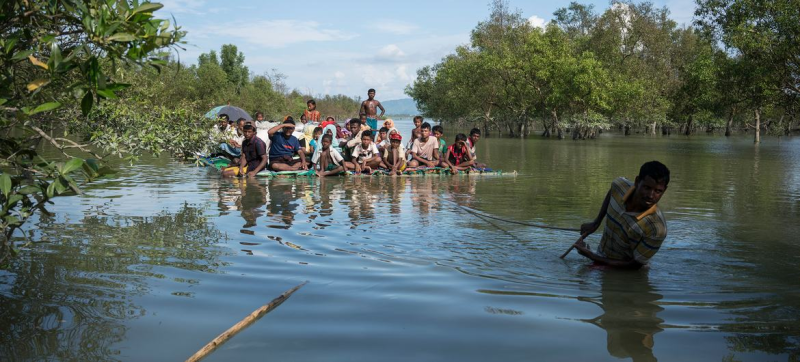- Restoring trust in Allah, Caretaker Govt; good governance, employment, no-revenge BNP's key election pledges |
- ভোটকেন্দ্র ও ভোটার নম্বর জানবেন যে ৪ পদ্ধতিতে |
- Sri Lanka urges Pakistan to reconsider India match |
- Centre of World Cup storm Mustafizur lands PSL deal with Lahore |
Rohingya Crisis in Myanmar Seen as ‘Test for Humanity’

Rohingya refugees cross the Naf River on a makeshift raft while fleeing violence in Myanmar, on their way to Bangladesh in 2017.
“Houses burned. Neighbours killed. Hope vanishing.” With those stark words, General Assembly President Annalena Baerbock opened a high-level UN conference on Tuesday, as alarm grows over Myanmar’s worsening crisis, which threatens regional stability.
At the heart of the emergency are the Rohingya Muslims, denied citizenship, driven from their homes and forced into camps or exile. More than a million now live as refugees in Bangladesh, while countless others remain displaced or trapped inside Myanmar under what UN leaders described as “dire” and “unsustainable” conditions.
The New York conference brought together UN officials, heads of state, governments, and Rohingya activists to galvanise action. Reports highlighted abuses since the February 2021 military coup: forced recruitment, sexual violence, airstrikes, starvation, and mass displacement.
Humanitarian agencies warn resources are dwindling, leaving refugees malnourished and pushing more people into risky sea journeys. Conditions in Rakhine state – the Rohingya’s ancestral homeland – are the worst in decades, with civilians caught between junta forces and ethnic armed groups.
UN Secretary-General António Guterres, in a statement read by his Chief of Cabinet Courtenay Rattray, said the crisis has “trampled on the human rights, dignity and safety of millions and threatens regional stability.” He urged immediate steps to protect civilians, guarantee humanitarian access, and support host communities.
Baerbock stressed that over five million Rohingya share this suffering. In Cox’s Bazar alone, 800,000 children remain out of school. With the 2025 humanitarian response plan only 12 per cent funded, she declared: “This should put us to shame,” urging more aid and political will for safe and voluntary return.
Rohingya activist Wai Wai Nu said atrocities have worsened since 2017, warning that the exodus will continue “until there is no more Rohingya left in Myanmar.” She called for cross-border aid corridors, sanctions and prosecutions for atrocity crimes.
Rofik Husson of the Arakan Youth Peace Network recalled killings, forced conscription, village burnings and drone strikes, including a May 2024 massacre that displaced 200,000 people in one day. He urged creation of an internationally supervised safe zone.
UN Special Envoy Julie Bishop noted Myanmar’s crisis stems from the 2021 coup. With no ceasefire in place, she warned that planned elections would only fuel violence.
Despite grim accounts, speakers stressed that solutions are possible with political will. “The Rohingya people have survived eight years of hardship,” Baerbock said. “Their resilience is extraordinary. Our response must match it.”
For Rohingya activists, the demand was clear: justice is not optional—it is the only path to peace.

